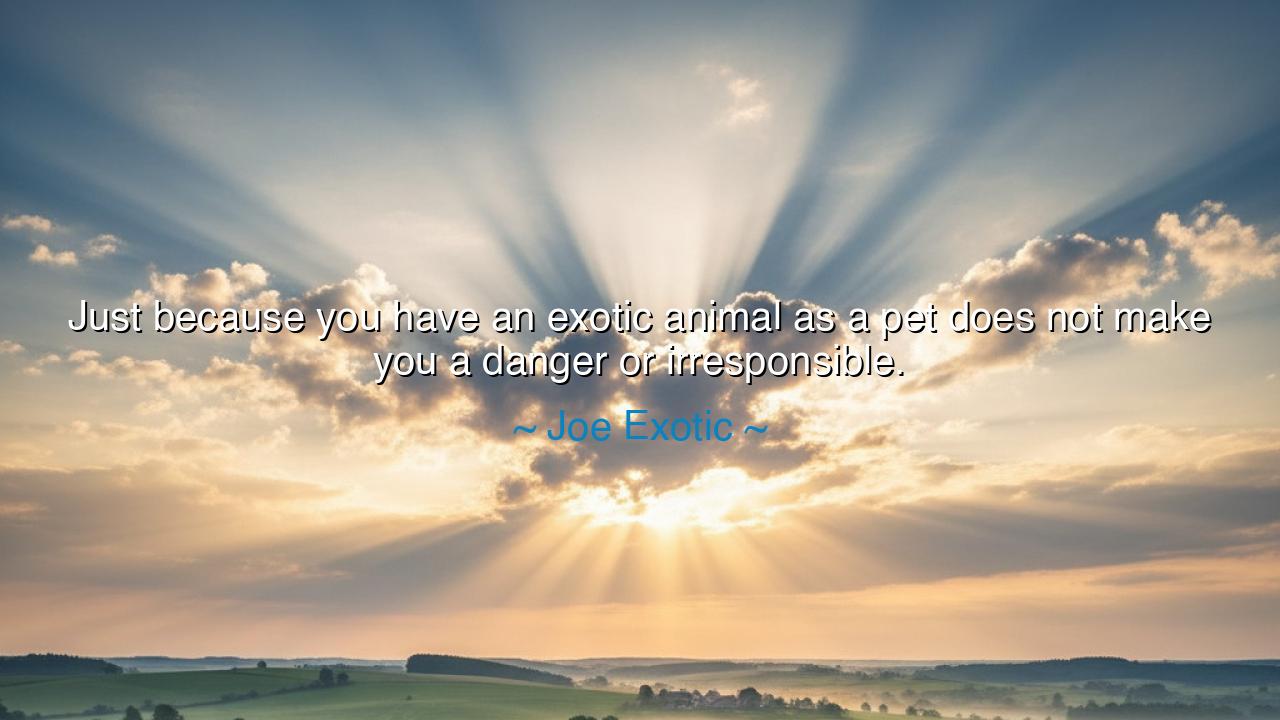
Just because you have an exotic animal as a pet does not make
Just because you have an exotic animal as a pet does not make you a danger or irresponsible.






Joe Exotic, a figure both infamous and unforgettable, once declared: “Just because you have an exotic animal as a pet does not make you a danger or irresponsible.” These words, though spoken in defense of his own life and choices, touch upon a deeper truth known since the earliest ages of man—that the worth of a person is not judged by what they possess, but by how they steward what has been entrusted to them. For an exotic animal, like any gift of creation, is neither inherently dangerous nor inherently safe; its meaning lies in the hand that tends it, whether careless or careful, foolish or wise.
The ancients understood this balance well. In Egypt, the pharaohs walked beside lions, not as conquerors alone but as symbols of divine kinship. Alexander the Great, too, was said to have tamed the mighty Bucephalus, a horse so wild no man dared approach it—until he discerned its fear of shadows and turned it toward the sun. These tales show that greatness is not defined by the strangeness of the creature, but by the discipline, respect, and understanding of the one who dares to care for it. Thus, Joe Exotic’s words remind us: responsibility is not found in appearances, but in action.
And yet, his statement is also layered with challenge. For society often fears what it does not understand. The sight of a man keeping tigers or serpents awakens suspicion, for the mind leaps quickly to danger, chaos, and destruction. But fear does not always mirror truth. The presence of the exotic does not necessarily mean recklessness. A tiger in a sanctuary, tended with wisdom, may live more peacefully than a neglected dog chained in a yard. Judgment must not be passed by the rarity of the creature, but by the care it receives.
History offers us warnings as well as encouragement. Consider the story of Hannibal, who led elephants across the Alps in his campaign against Rome. To many, the elephants seemed proof of his power, but the march left many beasts dead, for the mountains were crueler than his will. Here we see the danger of pride: to take on the exotic without full respect for its needs can lead to ruin. Responsibility is not a word to be spoken lightly—it demands patience, knowledge, and humility before the living being entrusted to one’s hands.
Joe Exotic’s defense also invites reflection on the human spirit. To care for an exotic animal is, in some sense, to acknowledge our yearning for the wild, for that which is untamed and beyond the ordinary. Yet such yearning must be tempered with wisdom. For man is not the master of creation, but its guardian. To keep the wild close is not inherently evil, but it is a trial of character. Do we seek only to dominate, to display, to boast—or do we seek to understand, to preserve, to honor? The difference lies not in the animal, but in the heart of the keeper.
The lesson here is timeless: judge not by appearances alone, but by the measure of responsibility. To own the rare, the powerful, the dangerous, is not itself a sin; the sin lies in neglect, in arrogance, in cruelty. Likewise, in life, wealth, knowledge, or power does not corrupt by their nature. It is the use of them, the manner in which they are wielded, that reveals whether one is dangerous or noble, foolish or wise.
Therefore, let these words be carried forward as teaching: if life grants you care of something exotic, whether a creature, a gift, or an opportunity, do not fear it, nor flaunt it. Instead, embrace it with humility, responsibility, and reverence. For possession does not define the soul—stewardship does. And in this balance, man proves not his desire for the wild, but his worthiness to live within it.






AAdministratorAdministrator
Welcome, honored guests. Please leave a comment, we will respond soon